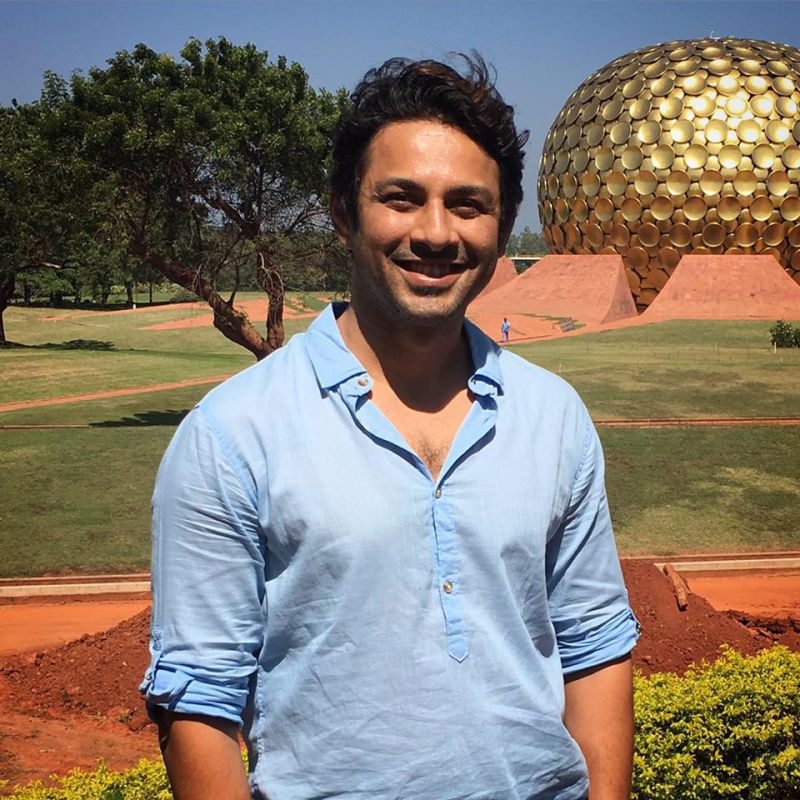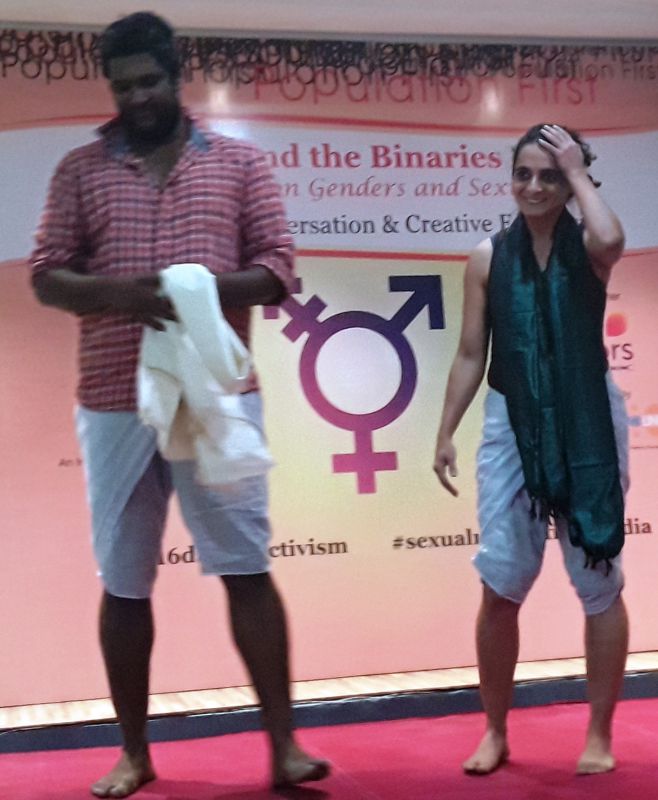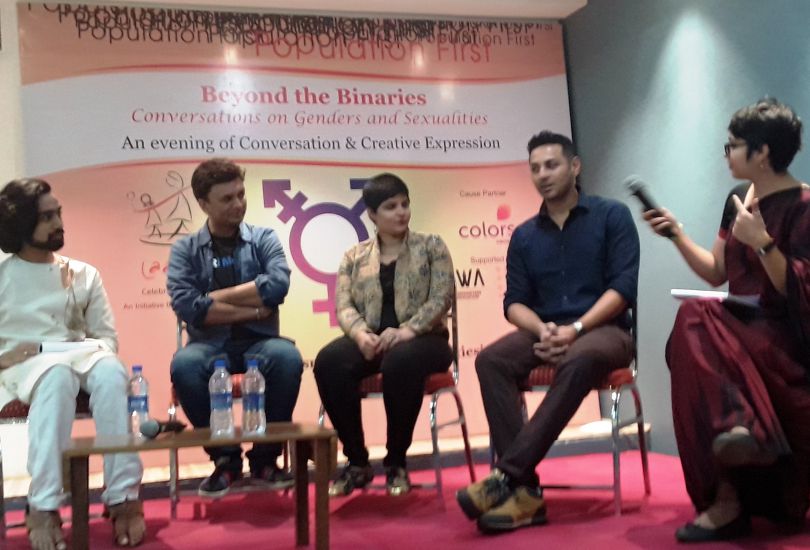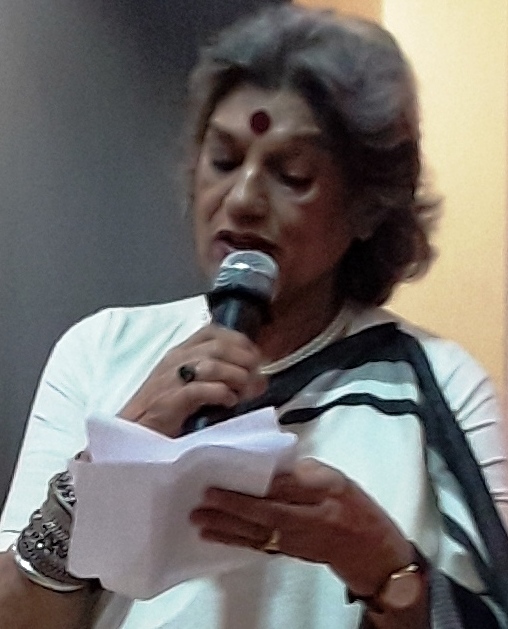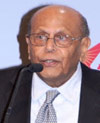|
|
||
|
Pro Tools
FILMFESTIVALS | 24/7 world wide coverageWelcome ! Enjoy the best of both worlds: Film & Festival News, exploring the best of the film festivals community. Launched in 1995, relentlessly connecting films to festivals, documenting and promoting festivals worldwide. Working on an upgrade soon. For collaboration, editorial contributions, or publicity, please send us an email here. User login |
Genders and Sexualities in Films and Society: Beyond the Binary
Genders and Sexualities in Films and Society: Beyond the Binary Sexuality and the stigmas attached to it, by the state/religion/patriarchal society, have meant both a private and public hell, for those human beings who do not classify as male or female. There are already a significant number of closet queers/homosexuals, lesbians, gays, bi-sexual and transgender persons who have come out of into the open, including celebrities, especially media, entertainment and fashion industry figures. Names like Great Garbo, Charles Laughton, Cary Grant, Anthony Perkins, Jodie Foster, Ellen DeGeneres, Bryan Singer, David Bowie, George Michael, Elton John, Freddie Mercury, Cynthia Nixon, Ricky Martin, Domenico Dolce and Stefano Gabbana, Giorgio Armani, Tracy Chapman, Rupert Everett, Pedro Almodovar, Queen Latifah, Neal Patrick Harris, Matt Bomer, Michelle Rodriguez (swings both ways, pictured above) have identified themselves as beyond the binary. Nearer home, in India, we have several personalities who feature in all discussions on the subject and are named as L/G/B/T/, but few have had the courage to admitting their sexual status. Names like Rohit Bal, Vikram Seth (public statement), Manish Arora (public admission), Manvendra Singh Gohil (a royal, known as the first Indian gay prince) occur often. Bobby Darling (Pankaj Sharma, underwent sex- change operation). Obvious names have been deliberately omitted.
Three film-related personalities turned up on December 10 at The Integral Space in Central Mumbai to read reports, recite poems, have panel discussions and present a snippet from a Hindu mythological epic, on the subject of Beyond the Binaries: Conversations on Genders and Sexualities. They were theatre-film actress, social worker and philanthropist, Dolly Thakore, editor script-writer Apurv (sometimes spelt Apurva) Asrani and theatre-film actress-director Faezeh Jalali. After proving himself as an editor with a keen eye, in films like Satya, Snip!, Shahid and CityLights, Apurva made his debut as a full-fledged screenwriter penning the story, screenplay and dialogue of Aligarh, directed by Hansal Mehta. The human rights biopic premièred at the Busan International Film Festival and had its UK première at the London Film Festival. It also enjoyed the rare honour of being the first Indian film to open the Mumbai Film Festival in 16 years, last year. It got limited release in multiplexes earlier this year. Aligarh derives its title from a town in Uttar Pradesh state of India, and a University named after the town, Aligarh Muslim University (AMU). It received a standing ovation after its screening at Busan, South Korea. When it came to theatrical release, the movie faced censor issues and the makers were not happy with the cuts (deletions) imposed on them. The Chairperson called their protests publicity stunts. They wanted to fight with the Tribunal. But as there wasn’t enough time for the tribunal to watch and certify the movie, the makers tried a trick: they made a collage/medley of all the films that were passed with Universal (U) Exhibition certificates and Universal--but children must be accompanied by Adults (UA) certificates, in spite of nudity, obscene language and sex. Here they were offering an Adults (A) Only certificate, but with cuts too. Finally, the makers accepted the some of the cuts suggested by the censor board, as a compromise, and released the film.
Talking about film, Asrani revealed that most of the problems it faced were pre-production or post production. “We were sued by the Professor’s family, who denied that Siras had any bisexual or homosexual leanings. Then, we faced censorship issues of the worst kind. The Panel members said things I could not believe, to deny the film a wider, unscathed release. Finally, after release, the multiplexes ran empty, and it broke my heart when I saw this for myself. We were lucky in getting a good release, thanks to some big names associated with the film---most such subjects would not find it easy--but were unsuccessful in reaching many viewers.” On the issue of his own sexuality, Apurv has already declared in the media, “I am tired of living like a 2nd class citizen. Tired of pretending to be someone that I’m not. It makes my blood boil when you can hold your heterosexual partner publicly, but I can’t. It angers me when you introduce your ‘husband’ or your ‘wife’ at a public event and I have to introduce my partner as my ‘friend’. I am frustrated that when I sign my insurance papers, I can’t nominate the man who has stood by me for 9 years; nor can I adopt a child with him.” Faezeh Jalili presented an excerpt from her play, Shikhandi, about the sister of the woman who was at the centre of the Mahabharat tale, Draupadi. As an actress, Faezeh was seen in Qissa, Qurbaan and Slumdog Millionaire. She is the Founder at FATS Theatre and Fat Productions (if the name is eponymous, maybe she was obese a decade ago; she is in great shape now!). Earlier associated with The Drama School, Mumbai and The Comedy Store, Faezeh studied Theatre at the University of Tennessee, Knoxville and did stints at Berlin Post School, KiM: Physical Theatre and Dance, and Beloit College.
Shikhandi questions gender and sexuality in ancient times. The Story of the in-betweens it’s a tale of one of the earliest trans* (that’s the new, accepted term for the all encompassing non-binary community, we were told by social scientist Smriti Nevatia, who, earlier presented the findings of a survey) characters in mythology. Bagging the Runner-Up prize at the Sultan Padamsee Awards, she won Rs. 25,000. (Established in 1965, the Sultan Padamsee—younger brother of Alyque Padamsee--Award is aimed to celebrate new voices emerging from Indian theatre. It had been discontinued for two decades, and only revived this year. Sultan died at the age of 24). Having written a play for the first time, the theatre actor-cum-director plans to use the prize money to produce the play with some help from the prize money. Speakers included well-known Harrish Iyer (equal rights activist), Sonal Glani (bi-sexual actvist) and Meet (Meet is a proper noun here; he is an Assistant Professor at Mumbai University) Tara Dnyaneshwar. Dolly Thakore, National Co-Ordinator for Laadli Girl Child campaign media award, recited a poem by Harnidh Kaur. Harrish rued the absence of a Phoolan (dreaded dacoit) Devi-like character with L/G/B/T/+ sexuality on Indian screens, and Meet lamented the fact that stereo-typing never ends, whatever the next or new label. Every label has its own narrow span, he asserted.
Sonal was encouraged by the response shown by the police to cases of violence and victimisation and disagreed with this writer, who tried to caution them against the apathy and corruption in the law enforcers of the country, and not to expect much help from them. All agreed on the need for strong pressure groups and NGOs to back the cause. Harrish made a strong pitch for supporting and joining the Gay Pride march, to be held early next year.
Grace Singh and Prakash Thangadas also read their poems; all three poems were curated from ‘#16 Days of Activism Against Gender-Based Violence Contest’. Animated videos by Gaysi (Organisation) were also shown. Dolly had read out the poetry by Harnidh Kaur At the event, every performer and participant was felicitated with a bag of goodies, presented, in turns, by Dolly, and S.V. ‘Bobby’ Sista, Executive Trustee of Population First. Sista ran an advertising agency called Sistas for many a decade, and refuses to hang his boots, even at 85. Nishtha Vashisht(a), also part of the UNESCO family, based in Delhi, was among the attendees, having flown down especially for the occasion. At the event, every performer and participant was felicitated with a bag of goodies, presented, in turns, by Dolly, and S.V. ‘Bobby’ Sista, Executive Trustee of Population First. Sista ran an advertising agency called Sistas for many a decade, and refuses to hang his boots, even at 85. Nishtha Vashisht(a), also part of the UNESCO family, based in Delhi, was among the attendees, having flown down especially for the occasion. Veena Vinod, Communications Manager, received the guests.Veena Vinod, Communications Manager, received the guests. Ishmeet Nagpal, Programme Manager, Population First, compèred the event, while the panel discussion was moderated by Srinidhi Iyer, Gender Specialist, Population First. Support was extended by the Colors Viacom TV channel group and the Screen Writers’ Association. Media was conspicuous by its absence, present company probably being the sole exclusion. Sound system played on, off and crackling games: one way now, another way then and another way next. (Incidentally, a sandwich and tea do not qualify as the ‘high-tea’ promised in the flyer. It was sure a sip and a bite, but certainly not enough to make you ‘high’). ----------------------------------------------------------------------------------------------------------------------------------------------------------------------------------------
Rewarding creativity in highlighting a burning issue, Laadli Media Awards for Gender Sensitivity were launched in 2008 by Population First, a UNESCO wing, to promote awareness about issues that are often either swept under the carpet, vehemently opposed or even violently attacked. Laadli means dear/loved/spoilt/indulged, in Urdu/Hindi, and is female in connotation. You could submit entries in audio visual forms and many other formats, and win prizes. The last date has been extended from 15th December to 25th December. Detailed info on: http://populationfirst.org/CALL%20FOR%20ENTRIES%202015-16_A3%20Final%20Version.pdf Entry form: http://populationfirst.org/Entry_form_LMAAGS_2015_English.pdf 14.12.2016 | Siraj Syed's blog Cat. : 16 Days of Activism Aligarh Anthony Perkins Bobby Darling Bryan Singer Cary Grant Charles Laughton colors cynthia nixon David Bowie Deepu Sebastian Dolly Thakore Domenico Dolce and Stefano Gabbana Draupadi Ellen DeGeneres Elton John Faezeh Jalali FATS Prodcutions FATS Theatre Freddie Mercury Gaysi George Michael Giorgio Armani Grace Singh Great Garbo Harnidh Kaur Ishmeeta Nagpal Jodie Foster Laadli Mahabharat Manish Arora Manvendra Singh Gohil Matt Bomer MICHELLE RODRIGUEZ Neal Patrick Harris Nishtha Vashisht Pankaj Sharma Pedro ALMODOVAR Population First Prakash Thangadas Queen Latifah Ricky Martin Rohit Bal Rupert Everett S.V. 'Bobby' Sista Section 377 Indian Penal Code Shikhandi Shrinivas Ramchandra Siras Srinidhi Iyer Sultan Padamsee Tracy Chapman Veena Vinod Vikram Seth News
|
LinksThe Bulletin Board > The Bulletin Board Blog Following News Interview with IFTA Chairman (AFM)
Interview with Cannes Marche du Film Director
Filmfestivals.com dailies live coverage from > Live from India
Useful links for the indies: > Big files transfer
+ SUBSCRIBE to the weekly Newsletter Deals+ Special offers and discounts from filmfestivals.com Selected fun offers
> Bonus Casino
User imagesAbout Siraj Syed Syed Siraj Syed Siraj (Siraj Associates) Siraj Syed is a film-critic since 1970 and a Former President of the Freelance Film Journalists' Combine of India.He is the India Correspondent of FilmFestivals.com and a member of FIPRESCI, the international Federation of Film Critics, Munich, GermanySiraj Syed has contributed over 1,015 articles on cinema, international film festivals, conventions, exhibitions, etc., most recently, at IFFI (Goa), MIFF (Mumbai), MFF/MAMI (Mumbai) and CommunicAsia (Singapore). He often edits film festival daily bulletins.He is also an actor and a dubbing artiste. Further, he has been teaching media, acting and dubbing at over 30 institutes in India and Singapore, since 1984.View my profile Send me a message The EditorUser contributions |

















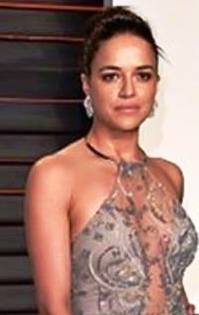
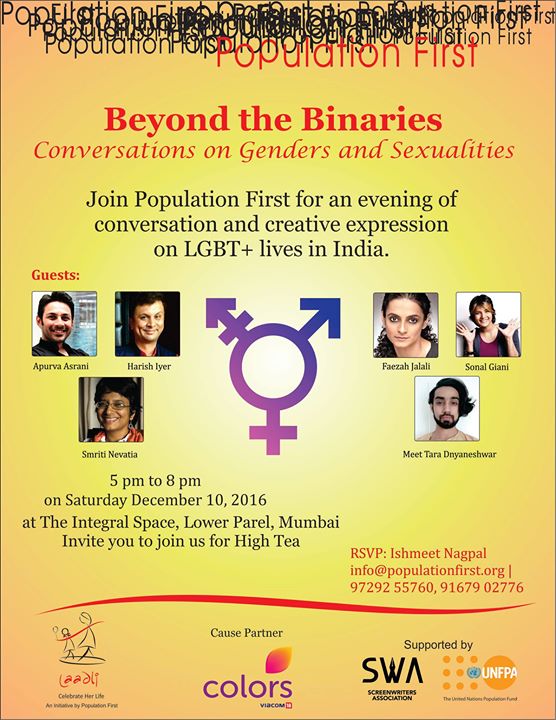
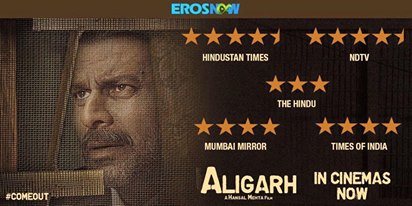 Aligarh, the film, is based on the true story of Professor Shrinivas Ramchandra Siras, a shy academic, and real-life journalist Deepu Sebastian, who wrote about the case in The Indian Express (called India Post in the film). Siras was thrown out of AMU, in 2010, after he was filmed by intruders while having sex with a male rickshaw puller in his quarters, on campus. This happened in the year following the Delhi High Court’s historic ruling, reading down Section 377 of the Indian Penal Code, to effectively decriminalise homosexuality (overturned in 2013 by the Supreme Court, and now once again under the scanner of a larger SC bench of judges). Professor Siras successfully sued AMU in the Allahabad High Court. Shortly afterwards, he was found dead in mysterious circumstances, in his apartment, in what was at first suspected to be a suicide.
Aligarh, the film, is based on the true story of Professor Shrinivas Ramchandra Siras, a shy academic, and real-life journalist Deepu Sebastian, who wrote about the case in The Indian Express (called India Post in the film). Siras was thrown out of AMU, in 2010, after he was filmed by intruders while having sex with a male rickshaw puller in his quarters, on campus. This happened in the year following the Delhi High Court’s historic ruling, reading down Section 377 of the Indian Penal Code, to effectively decriminalise homosexuality (overturned in 2013 by the Supreme Court, and now once again under the scanner of a larger SC bench of judges). Professor Siras successfully sued AMU in the Allahabad High Court. Shortly afterwards, he was found dead in mysterious circumstances, in his apartment, in what was at first suspected to be a suicide.